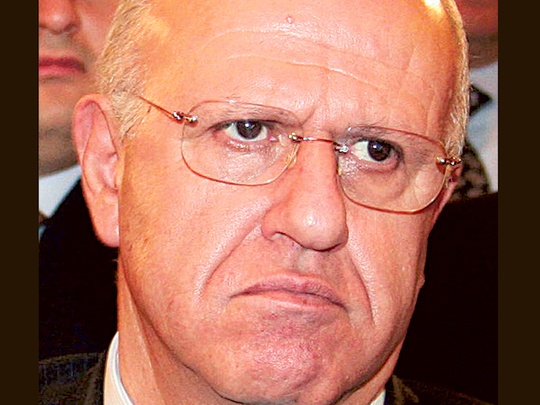
Beirut: A Lebanese judge ordered a retrial of a former minister on Monday who was sentenced to 4-1/2 years in prison last week for smuggling explosives into Lebanon from Syria and planning terrorist attacks.
The sentencing of Michel Samaha, who is close to the Syrian government, drew harsh criticism from Lebanese politicians and members of the public who considered his punishment too lenient.
Samaha has been in detention since August 2012 and his case has gripped Lebanon because such action against Damascus or its Lebanese allies was once unthinkable.
He was sentenced on Wednesday by a military court after confessing last month to the charges and giving details of the plot allegedly devised with Syria’s security chief, Ali Mamlouk.
The arrest of Samaha and indictments against two Syrian officials, one a top general, in the case, marked a major break with the past. Top Syrian officials have previously denied the charges but have not commented on the verdict.
Samaha’s trial reflects how the crisis in Syria is rippling through a country where Damascus has played a major role for decades and whose future will be shaped by the outcome of the four-year conflict next door. Ashraf Rifi, who belongs to the March 14 camp but who earlier served as head of the Internal Security Forces (ISF), announced that he planned to authorize an appeal of the verdict as well as introduce a new law to abolish the Military Tribunal. Speaking to Al Jumhuriyyah, the Justice Minister demanded “an amendment to the regulations of the Tribunal,” as he revealed that members of the Military Tribunal apparently failed to watch video recordings of Samaha in which the culprit spilled the beans.
The videos were broadcast on several local television stations. MTV, Al Mustaqbal, Tele-Liban and LBC carried them in full, while OTV, Al Manar, Al Jadid and NBN used short extracts in their news reports, or opted not to show them. Remarkably, the perfectly clear and audible videos highlighted the former official discussing both the transportation of explosives and the plans to carry out attacks and assassinations.
Samaha acknowledged that only two high-ranking Syrians knew about the assassinations, President Bashar Al Assad and the chief of Syrian Security Services Ali Mamlouk.
Minister Rifi was livid in several television interviews and linked the light sentence to the current political situation in Lebanon “where a statelet is exerting its influence” over proceedings.
“The statelet, meaning Hezbollah,” affirmed Rifi, “is a product of the remnants of the Syrian regime in Lebanon. We should therefore wage a battle against this influence on all levels and institutions and strive for the establishment of the state.”
Samaha, who was sentenced for “having tried to carry out terrorist actions and for belonging to an armed group” and who was also stripped of his civil and political rights,” argued that he had been the victim of ISF entrapment although his video confessions, which the Military Tribunal opted not to watch it was worth repeating, left no room to quibble.
In fact, and in the aftermath of the public uproar, the State Commissioner to the Military Court Judge Saqr Saqr let it be known that he intended to appeal the verdict according to Al Nahar. On Saturday, the daily reported that the video showed the former minister with informant Milad Kfouri, whose critical testimony was apparently inconclusive. Whether victims associated in the affair, or ministers and deputies specifically mentioned in the recording—and who were explicitly targeted for assassination—would now file a suit before a civil court, or demand Samaha’s retrial on murder attempt charges, remained to be determined.
Lebanon continued to suffer from the consequences of the long civil war that crippled the country’s institutions. Few doubted that the three-decades long Syrian occupation encouraged lawlessness by ongoing militias, which created a certain mentality towards justice that can only be described as being selective. Over the weekend, family members of alleged extremists held without trial for over a decade vented their frustrations with the judiciary, by demonstrating in front of Roumie jail, Most believed the judiciary was highly partial.
For his part, Minister Rifi spoke about the Military Tribunal’s impartiality last October, and even called for the court’s writ to be limited to try accused men and women in uniform. “We want to stop trying civilians in the military court,” Rifi was quoted in the pro-March 14 Al Liwa’ daily then, arguing that military officers “are not [law] specialists, and there are doubts over the fairness of the [court’s] verdicts.” If Rifi’s October 2014 calls reflected tensions among leading Sunni officials who accused the military court of bias, the Samaha verdict issued by General Khalil Ibrahim confirmed the minister’s worst fears.
Most Lebanese shared his profound apprehensions.












